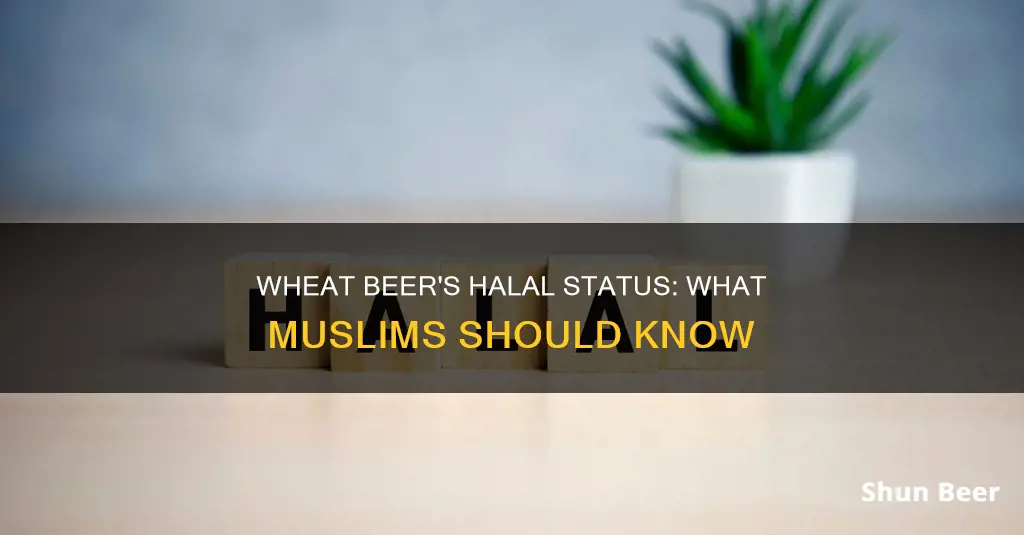
Alcoholic drinks are considered haram under Islamic law, as they are classified as intoxicants. However, the question of whether non-alcoholic beer is halal or haram is more complex. While some scholars argue that non-alcoholic beer is permissible, as the amount of alcohol in these beverages is negligible, others maintain that any drink containing alcohol is haram. Ultimately, the ruling depends on the interpretation of Islamic texts and the intent behind consumption, with some scholars distinguishing between alcoholic and non-grape-based alcoholic beverages.
| Characteristics | Values |
|---|---|
| Definition of Wheat Beer | An alcoholic beverage made from wheat |
| Islamic View on Wheat Beer | Haram if used as an intoxicant, permissible for medical purposes, hygiene, or perfume |
| Islamic Texts on Wheat Beer | "Every intoxicant is khamr, and every intoxicant is haram" |
| Scholarly Views | Varying opinions, some consider non-intoxicating wheat beer permissible |
What You'll Learn

Alcohol is forbidden in Islam
Alcohol is forbidden, or 'haram', in Islam. Islamic scholars and Muslim religious authorities cite a verse in the Quran, the Muslim holy book, that calls intoxicants "the work of Satan" and instructs believers to avoid them.
The Arabic word for wine or intoxicant is 'khamr' and is defined as alcoholic beverages, wine or liquor. The Quran does not prescribe a penalty for consuming alcohol, but some hadith (or traditions attributed to the Prophet Muhammad) refer to flogging as punishment.
The Quran's stance on alcohol was revealed over time, with four revelations of increasing severity. The first revelation states that wine is a gift for humankind, the second that alcohol and gambling are sins but are still useful, the third that believers must not pray when drunk, and the fourth that wine, gambling and idol worship are abominations of Satan.
The reason for the prohibition of alcohol in Islam is due to its intoxicating effects, which are believed to be destructive to the individual and their obligations to the community.
There is some debate within Islam as to whether the intention was a total ban on consuming alcohol or a prohibition on drinking to the point of intoxication. Historically, many Muslim elites consumed alcohol, and some minor factions of followers of Abu Hanifa and Abu Yusuf permitted alcohol derived from honey, barley, wheat and millet, such as beer. However, from the 12th century onwards, all Islamic legal schools embraced the general prohibition of all alcoholic beverages.
Today, some Muslims still consume alcohol, believing it is not forbidden in the Quran. However, most Muslims surveyed across the globe in a Pew Research Center survey said that drinking alcohol was morally wrong. Islamic countries have low rates of alcohol consumption, and it is completely banned in several nations.
Fat Tire Beer: Wheat-Free or Not?
You may want to see also

Non-alcoholic beer is permissible in Islam
In Islam, the consumption of alcohol is prohibited as it is considered an "intoxicant" or "defilement from the work of Satan". This means that Muslims are not allowed to consume any kind of intoxicating substance, with the Quran specifically calling out alcohol as haram.
However, the question of whether non-alcoholic beer is permissible for Muslims is more complex. Non-alcoholic beers often contain 0.05% to 0.5% ABV, and even those labelled as alcohol-free can contain up to 0.05% ABV. While some Muslims may argue that the presence of any alcohol, no matter how minimal, makes it haram, others contend that the amount of alcohol in non-alcoholic beer is negligible and therefore, it is permissible.
The Islamic Religious Council of Singapore, for instance, takes the position that non-alcoholic beer is haram because it is produced in the same way as regular beer, and because it is drunk as an alternative to alcoholic beer, which goes against Islamic principles.
On the other hand, scholars like Shaykh Ibn ‘Uthaymin have stated that non-alcoholic beer is halal, as long as it has been inspected and found to be completely free of alcohol. The principle here is that all food and drink are permissible unless proven to be haram. In the case of non-alcoholic beer, the amount of alcohol is so small that it is unlikely to have any intoxicating effect, and therefore, it does not fall under the category of haram.
Additionally, non-alcoholic beers are often brewed with ingredients such as hops and grain, which are considered halal. Furthermore, some non-alcoholic beers have even received halal certification from organisations like Halal Australia and the Islamic Food and Nutrition Council of America, indicating that they meet the strict standards for consumption by Muslims.
While there may be differing opinions among Muslims, the general consensus is that non-alcoholic beer is permissible in Islam as long as it does not contain any intoxicating amount of alcohol.
Wheat Beers and Psoriasis: A Cloudy Concern?
You may want to see also

Alcoholic beer is haram
In Islam, alcoholic beer is considered haram. This is because the Quran prohibits the consumption of intoxicating substances, classifying them as "defilement from the work of Satan".
The Arabic word for wine or intoxicant is "khamr", and it is used to refer to forbidden substances in Islamic law. While there are differing interpretations among Islamic legal schools, the majority view is that the term applies generally to any intoxicating beverage, including beer.
The Prophet is quoted as saying, "Every intoxicant is khamr and every intoxicant is haram", and "Whatever intoxicates in large quantities, a little of it is haram". This indicates that even a small amount of an intoxicating substance is forbidden, regardless of whether it causes intoxication in that specific instance.
However, it is important to note that the concept of "khamr" is not limited to alcoholic beverages. Some Islamic scholars have historically classified other substances, such as opium and khat, as "khamr" as well, indicating that the prohibition extends beyond just alcohol.
The ruling on alcoholic beer as haram is clear in Islamic law, and it is based on the understanding that intoxicants are harmful and contrary to the teachings of the Quran and the Prophet.
Furthermore, the punishment for consuming alcohol in Islam is a subject of debate among scholars. While the Quran does not prescribe a specific penalty, some hadiths mention punishments such as flogging with palm branches or lashes. The number of lashes also varies according to different schools of Islamic jurisprudence, with the Maliki, Hanbali, and Hanafi schools advocating for 80 lashes, while the Shafi'i school suggests 40 lashes.
German Beer: Wheat, Wonder, and Beyond
You may want to see also

Intoxicants are haram
Alcoholic beverages are considered haram in Islam. The Quran prohibits the consumption of alcohol, deeming it a form of "intoxicant" or "defilement from the work of Satan".
The Quranic verse below explicitly states that intoxicants are among the "abominations of Satan's handiwork", and that Muslims should refrain from them:
> O you who believe! Wine, gambling, idols, and lottery are all of Satan’s work. You refrain from it. Hopefully, you can succeed. Surely Satan wants to create animosity and animosity among you through alcohol and gambling and creates obstacles in you from remembering and praying from Allah. So will you refrain from these things?
Prophet Muhammad also emphasised the prohibition of intoxicants, stating:
> Every intoxicant is khamr and every intoxicant is haram.
> Whatever intoxicates in large quantities, a little of it is haram.
The consumption of alcohol is forbidden due to its negative impacts on the individual and society. Alcohol is addictive and impairs one's intellect, making it difficult to distinguish between right and wrong. It can lead to criminal activity as users become disinhibited, and it can be particularly detrimental when consumed in the presence of children, who may be influenced to drink in the future.
While some modern Muslims may view drinking alcohol as a personal choice, Islam considers the use of all intoxicants as haram. The punishment for intoxication is outlined in the Quran and further elaborated on by Islamic scholars and jurists.
Crawford Bock Beer: Is It Wheat-Based?
You may want to see also

Alcohol derived from wheat is haram when used as an intoxicant
In Islam, the consumption of alcohol is prohibited as it is considered to be a form of "intoxicant" or "defilement from the work of Satan". The Quran states:
> "Indeed, intoxicants, gambling, [sacrificing on] stone alters [to other than Allah], and divining arrows are but defilement from the work of Satan, so avoid it that you may be successful."
As a result, Muslims are not permitted to consume any kind of intoxicating substance, including alcoholic beverages. The term "khamr" in Arabic refers to wine or any intoxicating beverage, and it is considered "haram" in Islam.
When it comes to beer, there are two types: intoxicating and non-intoxicating. Intoxicating beer, which contains alcohol, is considered haram. The Prophet said, "Every intoxicant is khamr and every intoxicant is haram." This means that drinking even a small amount or a single drop is prohibited.
On the other hand, non-intoxicating beer, which is completely free of alcohol or contains a minuscule amount that does not cause intoxication, is generally considered permissible or "halal". This is because the basic principle in Islam is that all food and drink are permissible unless proven otherwise. However, it is important to note that the presence of any alcohol, even in minuscule amounts, technically makes a substance haram.
Alcohol derived from wheat, as with any other substance, is haram when it is used as an intoxicant. This means that if the amount of alcohol derived from wheat is sufficient to cause intoxication, then it is prohibited in Islam. However, if the amount of alcohol is minuscule and does not have any intoxicating effect, then it may be permissible, similar to the ruling on non-intoxicating beer.
It is worth noting that there have been differing interpretations of the Islamic laws regarding intoxicants throughout history, with some scholars permitting alcohol derived from sources other than grapes or dates, such as wheat, barley, or honey. However, the majority view today is that all forms of alcohol are prohibited, regardless of their source, if they are used as intoxicants.
Wheat Beer Expiry: How Long Does It Last?
You may want to see also
Frequently asked questions
Yes, wheat beer is haram if it is used as an intoxicant, in an amount that intoxicates.
The Quran prohibits the consumption of alcohol, stating that "intoxicants, gambling, [sacrificing on] stone alters [to other than Allah], and divining arrows are but defilement from the work of Satan, so avoid it that you may be successful."
The Prophet says, "Every intoxicant is khamr and every intoxicant is haram." He also says, "Whatever intoxicates in large quantities, a little of it is haram."
Intoxicating beer is any beer that contains alcohol and has the potential to cause intoxication. Non-intoxicating beer, on the other hand, is completely free of alcohol or contains a minuscule amount of alcohol that does not lead to intoxication, no matter how much is consumed.
According to the Hanafi school of thought, alcohol derived from honey, wheat, barley, or corn is permissible if it is not used as an intoxicant and is intended for medical, hygiene, or perfume purposes.







